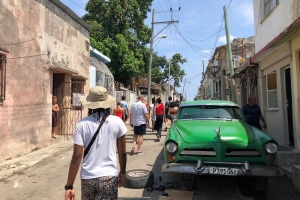
Running Up the Hill Students in Washington and Lee's six-week Washington Term program learn the pace of Washington, D.C. during their Spring Term.
“I tell the students that you’ve got to run up the hill. Washington is very competitive. Some of the most ambitious people you will ever meet will be there. If you want to succeed, you’ve got to work harder than you’ve ever thought you could work.”
~ Brian Alexander, professor of politics
Current and former students of Brian Alexander, professor of politics and director of W&L’s Washington Term program, are quick to cite one of Alexander’s signature phrases when reflecting on their Washington Term experience: “You have to run up the hill.”
Alexander, now in his seventh year of directing the six-week course and internship program in Washington, D.C., borrowed the phrase from an anecdote about Lyndon B. Johnson in a biography about the former president from which Alexander has all his Washington Term students read selected passages.
“There is this scene in the first book where the young Lyndon Johnson has his first job on Capitol Hill as an aide to a member of Congress,” Alexander said. “In this scene in the book, a woman describes seeing a young LBJ – tall and gangly, who had been up the night before until 2 a.m. reading the Congressional Record – coming to work in the morning to be the first one in the office as dawn breaks over the Capitol. This young woman says, ‘Here he comes up toward the Capitol, and he’s running. He’s running up the hill.’” Alexander uses this image to motivate and inspire students to embrace their Washington Term experience.
“I tell the students that you’ve got to run up the hill,” Alexander said. “Washington is very competitive. Some of the most ambitious people you will ever meet will be there. If you want to succeed, you’ve got to work harder than you’ve ever thought you could work.”
Washington Term was founded in 1987 by William Connolly, emeritus professor of politics, and to date has sent over 500 W&L students to Washington, D.C., for internships in politics and government across the city, offering students the opportunity to explore the layers of how American democracy functions at the national level. During the six-week Spring Term program, students live in D.C. while working on Capitol Hill, in nonprofits, think tanks, lobbying organizations, advocacy groups and news organizations. The program includes a six-credit college course, a guest speaker series, meetings with W&L alumni and regular group outings and site visits. It all begins with recruitment and interviews in the fall semester, followed by a Winter Term orientation class taught by Alexander, so that students can hit the ground in D.C. ready to go.
“I’ve always tried to create a microcosm of Capitol Hill,” Connolly said in a 2019 article marking the program’s 30th year, “a balance of Democrats, Republicans, liberals, conservatives, independents, libertarians, what have you. I always explain to Washington Term students that they are meant to be objective political scientists.”
Alexander took over the program upon Connolly’s retirement and has remained committed to creating a diverse cohort of students ready to commit to a vigorous six weeks in D.C.
“When I took on the program after Professor Connolly retired, I knew I was inheriting something great,” Alexander said. “And my goal was, frankly, to not mess it up.”
Students cite the program’s boots-on-the-ground D.C. experience as being a hallmark of the program.
“I applied for the program because I wanted to know if politics can make a difference in people’s lives and if policy can improve people’s lives,” said Addie-Grace Cook ’25, a politics major and 2024 Mock Convention press secretary, of her interest in joining this year’s cohort. “And I was just getting antsy sitting in the classroom talking about all these things — I wanted to be where it’s being done.”
Cook, a politics major with a double minor in Middle East and South Asia studies and poverty and human capability studies, said her experiences working in Virginia Senator Tim Kaine’s office have opened her eyes to the good that remains in American politics despite what the news cycle might lead us to believe.
“Working in Congress every day has shown me just the sheer amount of bipartisan collaboration and that there actually is a lot of work between the parties,” Cook said. “My experience really dispelled the notion that Congress is broken. There’s more collaboration than people think, and that’s a very good thing.”
Georgia Bernbaum ’25, a global politics major double minoring in poverty and human capability studies and women, gender, and sexuality studies, said she had the opportunity to contribute to a wide range of projects during her internship with the McCain Institute, including planning an event for the organization’s Defending Our Democracy program, and met with former senators, current congressional scholars and various government agencies throughout the term.
“I have learned that collaboration is the key to success,” Bernbaum said. She plans to continue her work with the McCain Institute this summer and explore her interest in national security through a virtual internship with the Office of the Director of National Intelligence in the fall.
Shae Reinberg ’25, a double major in environmental studies and global politics, worked as a policy intern at Oceana Institute, an international advocacy organization dedicated to ocean conservation. Reinberg said that she knew when she was accepted into Washington Term that she wanted her internship experience to be in a nonpartisan, issues-focused, non-governmental organization with environmental issues at its core.
“I am really interested in the intersection between the environment and policy, both as a solution to environmental problems and as an avenue for me to have an impact on issues that I care about,” Reinberg said. After talking with Washington Term alumni who had interned with Oceana in previous years, Reinberg knew her internship placement was the right fit. She said the experience has taught her not only more about her policy interests but opened opportunities for networking and learning about other advocacy organizations that might interest her in the future.
Conor Fagan, federal policy manager at Oceana Institute and Reinberg’s supervisor, said that Reinberg’s contributions as an intern are significant at a small organization like Oceana.
“Like many nonprofits, we’re a pretty tiny team — our policy team is four people, and the campaign teams are very small,” Fagan said, “so partnering with Washington Term is a great opportunity for us to get some boots on the ground. In addition, Shae is a fantastic thought partner. When talking about strategy, it is often great to get a fresh set of eyes, and everything Shae has been tasked with brushing up on in preparation for meetings, she dove right in. She contributed off the cuff very impressively.”
In addition to their professional and networking experiences, Alexander said he wants to ensure the program’s academic component is helping students understand how complicated the policy world is. The class now also involves completing a term paper requiring students to interview no fewer than 10 contacts in Washington about a topic that interests them outside their internship responsibilities. Alexander said this process encourages students to create even more valuable relationships in the city and gain insight that is only available through interviews.
“I have them develop a research question that they can only address in Washington, D.C.,” Alexander said. “They can choose any topic that intrigues them: ‘What’s the real effect of money in politics?,’ or ‘Do lobbyists actually make a difference?’ or ‘Does the polarization effect in the media affect the way think tanks work?’”
Bernbaum said her research paper was unlike any other research project she has completed.
“Some of my most interesting interviews had to be with Ambassador [Roger] Carstens, the special envoy to hostage affairs, and Bernard Hudson, the former chief commander of counterterrorism at the CIA,” said Bernbaum, whose paper focused on U.S. counterterrorism policy. “I was also fortunate enough to connect with W&L alums, who were more than willing to take time out of their busy schedules to speak with me. Tony DeMartino ’90 even invited me to his office and introduced me to colleagues of his who would be helpful in my research. I don’t know another university where the alumni are so eager to uplift and support current students.”
Jamie Tucker ’92, partner at law firm Akin Gump, was a part of one of the first Washington Term cohorts in 1991 and credits the program with launching his career trajectory. Tucker said its reputation has been built over decades of quality work from W&L students and a strong connection to W&L’s Washington, D.C., alumni.
“Washington Term is a great opportunity supported by W&L’s strong alumni network in the D.C. area, particularly in the policy arena,” said Tucker. “That alumni network is always there working on behalf of W&L students and alumni, and given the breadth of that network, it is something very helpful to be able to tap into as part of this experience.”
Anna Renou ’21, who served as political platform chair during the 2020 Mock Convention cycle and is a 2019 alumna of the Washington Term program, said the program introduced her to her eventual career path after graduation. Renou now works for the American Enterprise Institute, a think tank she first encountered during her Washington Term experience. Since joining AEI, she has been passionate about giving back to W&L students by organizing events during Washington Term with AEI speakers, hosting students at AEI’s headquarters and managing AEI’s internship program. Renou said that students interested in any aspect of the political arena should look at Washington Term as an opportunity to propel their career forward.
“It really does help cement that this is something they love not only in theory but also in practice,” Renou said.
Pierson Gammage ’24, a Washington Term alumna and recent graduate with her sights set on returning to D.C., said that Alexander’s commitment to having students explore complex questions through thought-provoking discussions was her biggest takeaway from the program.
“We cannot be more opposite politically,” Gammage said of Alexander, “but that has actually been the most valuable thing for me to have as a mentor. I felt like I learned how to be a thoughtful member of strong democracy, to weigh both sides equally and make a determination, but to never actually be done thinking about a topic.”
Cook said many of her favorite Washington Term moments were simply gathering back in her D.C. apartment with roommates and comparing notes on their eventful days.
“When we all come home and talk about our days — when one person went to the Supreme Court that day, another person had an event at Congress and another person met with the Ukrainian ambassador — it just feels like such a special opportunity to get these experiences that you’ll never have anywhere else,” said Cook. “One of the biggest benefits to this program that set it apart from a regular summer internship is that we are in a cohort. We all have a very similar work ethic. It creates this really rich environment where everyone is passionate about their jobs and interested in asking big questions about their experiences.”
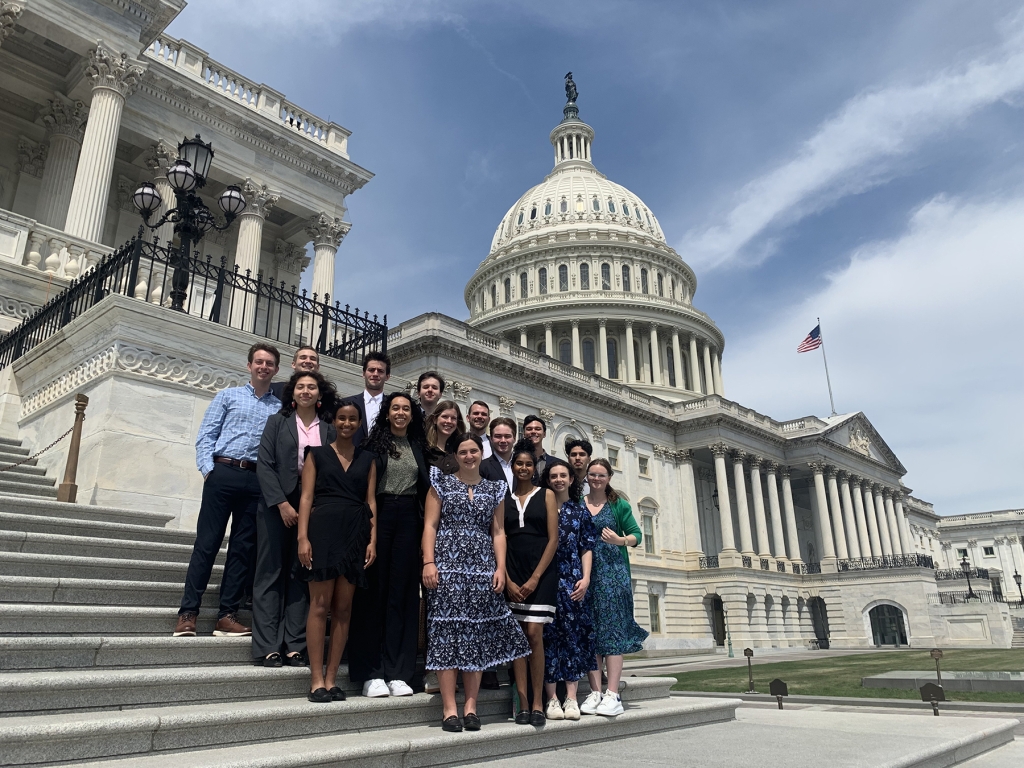 The Washington Term 2024 cohort on the Capitol steps
The Washington Term 2024 cohort on the Capitol steps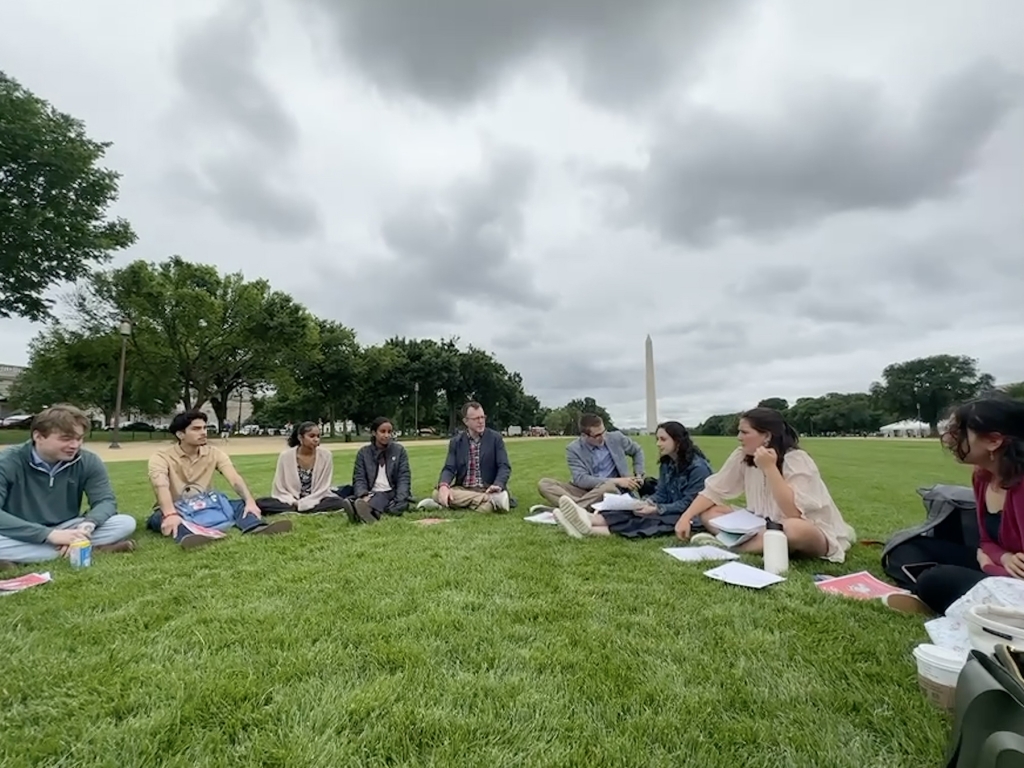 Washington Term students enjoyed site visits and weekly in-depth discussions.
Washington Term students enjoyed site visits and weekly in-depth discussions.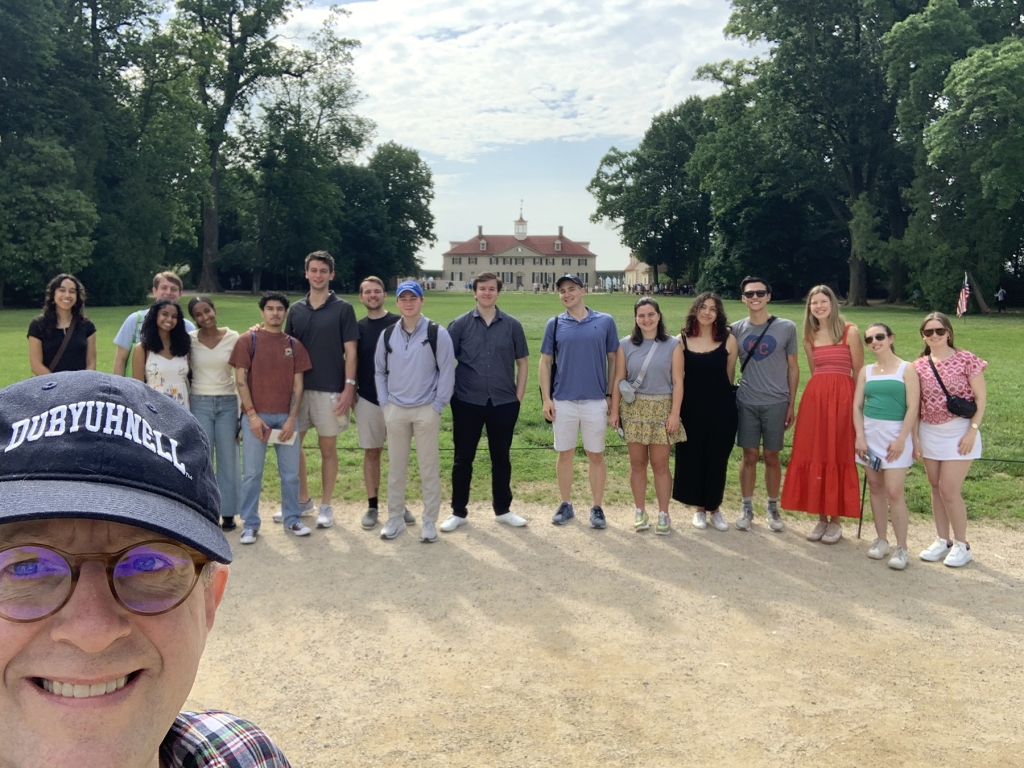 The group visits Mount Vernon.
The group visits Mount Vernon.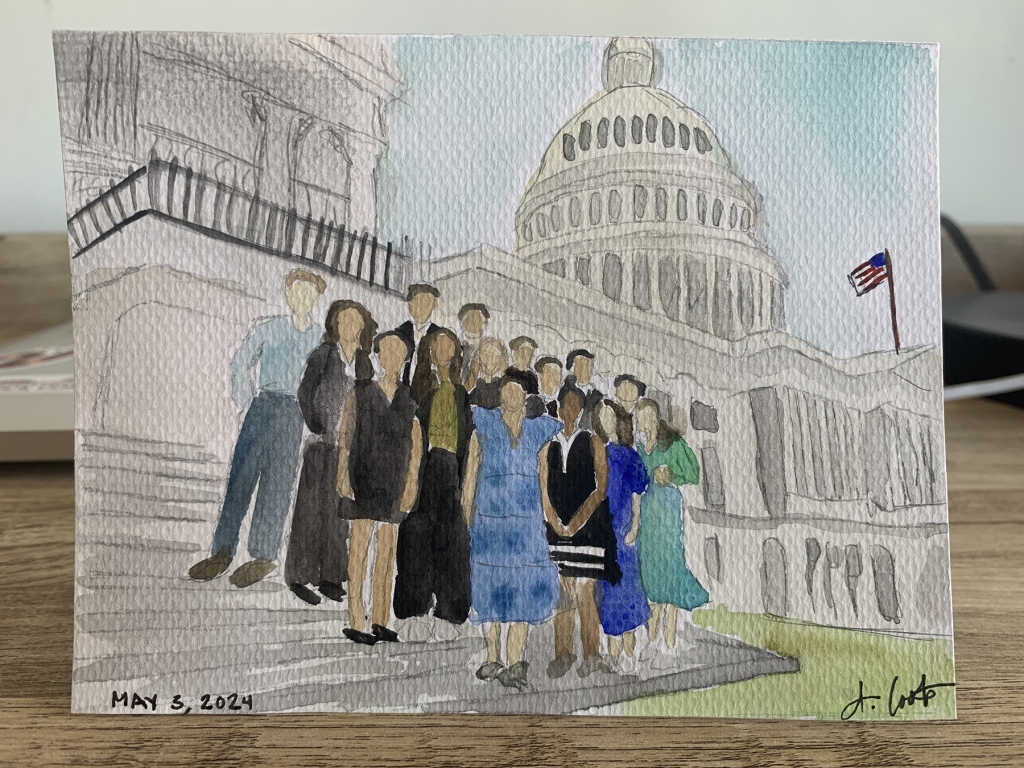 Addie-Grace Cook ’25 presented Alexander with an original watercolor of 2024 Washington Term Capitol steps photo.
Addie-Grace Cook ’25 presented Alexander with an original watercolor of 2024 Washington Term Capitol steps photo.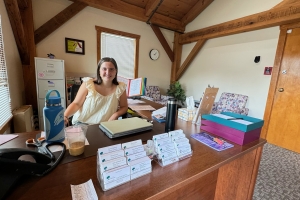
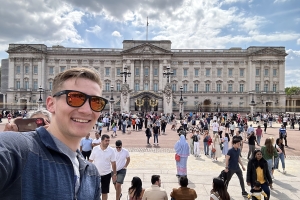

You must be logged in to post a comment.